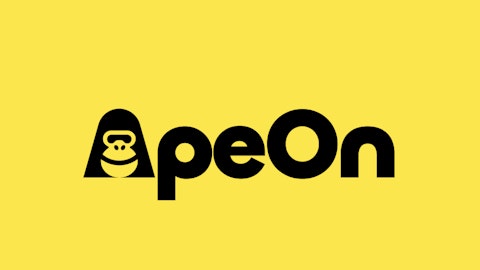We recently compiled a list of the 8 Stocks with Lowest Short Interest to Buy. In this article, we are going to take a look at where PepsiCo, Inc. (NASDAQ:PEP) stands against the other stocks with lowest short interest to buy.
A report from S3 Partners revealed that the rally in Chinese stocks as a result of stimulus measures cost traders who were betting against the US-listed shares ~$6.9 billion in mark-to-market losses. Benchmark CSI 300 index saw an increase of more than ~22% over the past month. The Nasdaq Golden Dragon index went up by over ~34% during the same period. Much of these increases were seen off the back of policy-easing measures.
S3 Partners went on to say that, before this market rally, short sellers continued to build their positions profitably in the falling market. However, after the rebound, the short selling in the group slowed. Before China announced the stimulus plans, shorting the Chinese stocks was a popular strategy, with several market players going underweight in the sector.
Short Selling in Q2 2024
S3 Partners reported that short interest in the US/Canada markets went up by $57.9 billion, or 5.1%, to $1.20 trillion in Q2 2024. The increase comprised $73.9 billion of new short selling, which was partially offset by a $16.0 billion fall in the mark-to-market value of shares shorted. During the quarter, the sectors that saw the largest increase in short selling were the IT, Industrials, and Communication Services sectors. On the other hand, the Energy sector was the only sector that saw a decrease in shares shorted (short covering).
Short Sellers Reduced Their Positions in This Sector
S&P Global reported that short sellers decided to pull back their bets against consumer staples stocks on the US exchanges during the summer months. This comes amidst the general increase in overall short interest throughout equities. Recent data suggests that the short interest in the consumer staples sector declined to 3.87% at the end of August from 4.16% at the end of May. The decline in short interest against consumer staples stocks might be due to the decline in inflation.
On the other hand, short interest in the industrial sector went up by 21 bps from the end of May to the end of August, rose 20 basis points in the healthcare sector, and jumped 19 basis points in the real estate sector, as per the company. With the expectations of further rate cuts, market experts opine that the consumer staples sector might see sustained demand. The consumer spending resulted in solid Q2 2024 Gross Domestic Product (GDP) growth of 3% (annualized), approximately double the rate of Q1 growth, as per the US Bank.
After the rate cut in September, market strategists recommended going long on consumer discretionary and consumer staples sectors. This is because these sectors are expected to receive a boost as declining mortgage rates might benefit spending, reported Reuters.
Therefore, with the expectations of lower inflation and interest rates, there can be some revival in consumer confidence. This should result in increased spending on staple goods, which might lead to improved performance in the consumer staple sector. As per Evercore, among the S&P 500 sectors, consumer staples and consumer discretionary have seen the best average performance, with both sectors gaining ~14% a year after the rate cut.
Our Methodology
To list 8 Stocks with Lowest Short Interest to Buy, we used a Finviz screener to extract the list of stocks having the lowest short interest. Next, we narrowed down our list to the following 8 stocks having short interest of less than 2%. Finally, the stocks were ranked in the descending of their short interest.
Why are we interested in the stocks that hedge funds pile into? The reason is simple: our research has shown that we can outperform the market by imitating the top stock picks of the best hedge funds. Our quarterly newsletter’s strategy selects 14 small-cap and large-cap stocks every quarter and has returned 275% since May 2014, beating its benchmark by 150 percentage points (see more details here).

A close up of a glass of a refreshing carbonated beverage illustrating the company’s different beverages.
PepsiCo, Inc. (NASDAQ:PEP)
Short % of Float (as of September 30): 1.31%
Number of Hedge Fund Holders: 65
PepsiCo, Inc. (NASDAQ:PEP) is engaged in manufacturing, marketing, distributing, and selling various beverages and convenient foods worldwide.
PepsiCo, Inc. (NASDAQ:PEP) has a strong foothold in a highly competitive F&B industry. The company’s diverse product portfolio, including both snacks and beverages, offers a degree of insulation against market fluctuations and changing consumer preferences. Moving forward, the company’s strong brand recognition and strategic market positioning are expected to act as critical tailwinds. Its diverse product range should further strengthen its competitive positioning.
PepsiCo, Inc. (NASDAQ:PEP) can leverage its robust presence in both snacks and beverages in order to create bundled offerings or promotions. This can help increase its overall sales. PepsiCo, Inc. (NASDAQ:PEP)’s broad portfolio enables it to negotiate better terms with suppliers and retailers, resulting in economies of scale. Therefore, its strong research and development capabilities, global market presence, and distribution network should continue to fuel long-term growth.
PepsiCo, Inc. (NASDAQ:PEP) continues to focus on enhancing its core products, investing in promotional efforts, and embracing digitalization in a bid to improve efficiency. The company continues to target long-term growth, stemming from changing snacking patterns, primarily among Gen Z consumers.
As per Wall Street, the shares of PepsiCo, Inc. (NASDAQ:PEP) have an average price target of $184.07.
Overall PEP ranks 6th on our list of the stocks with lowest short interest to buy. While we acknowledge the potential of PEP as an investment, our conviction lies in the belief that some deeply undervalued AI stocks hold greater promise for delivering higher returns, and doing so within a shorter timeframe. If you are looking for a deeply undervalued AI stock that is more promising than PEP but that trades at less than 5 times its earnings, check out our report about the cheapest AI stock.
READ NEXT: $30 Trillion Opportunity: 15 Best Humanoid Robot Stocks to Buy According to Morgan Stanley and Jim Cramer Says NVIDIA ‘Has Become A Wasteland’
Disclosure: None. This article is originally published at Insider Monkey.





